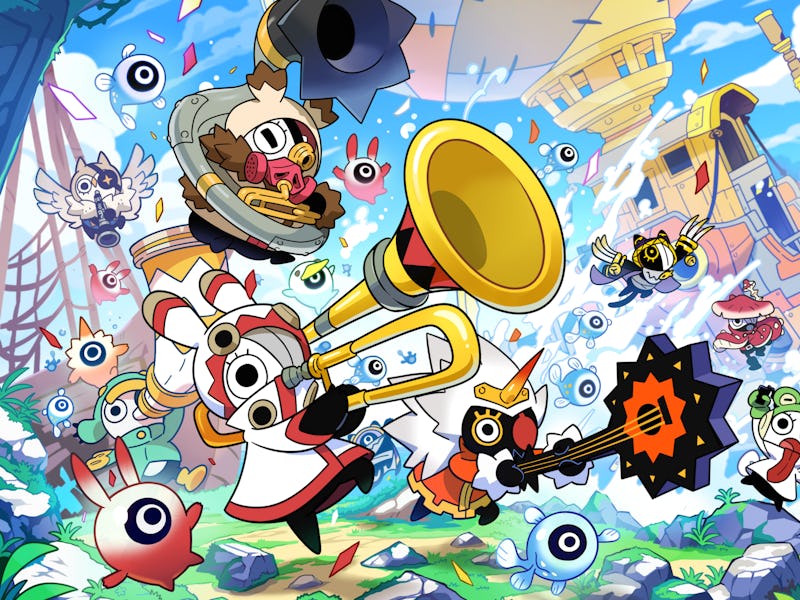Ratatan’s Delay Could Revamp The Patapon Successor’s Roguelike Turn
Ratatan is slowing the tempo on its release.

Patapon, a bizarre and excellent PSP rhythm game, will soon get a spiritual successor in Ratatan, but players are going to have to wait a bit longer for it to arrive. According to its developer TVT Co., the game’s Early Access launch will be delayed for now.
But that may actually be a good thing for anyone who was looking forward to it. Ratatan was originally set to launch in Early Access on July 25. Just a few weeks ahead of that, TVT Co. announced that it’s being postponed, citing passionate and constructive feedback based on a recent demo. Back in June, Ratatan was part of Steam Next Fest, giving potential players an early look at the game ahead of launch. The developer says more than 200,000 people downloaded the demo, leading to around 1,200 Steam reviews and 2,000 pieces of feedback sent directly to the developer.
Patapon spiritual successor Ratatan is being delayed to address feedback from its recent Steam demo.
As it turns out, those comments revealed some common criticisms of the game that the developer says it needs more time to address, choosing to delay the launch instead of starting off with players on the wrong foot. What’s most interesting about the throughlines TVT Co. points out are that the biggest problems with the game don’t seem to be bugs or performance issues, but rather the entire structure of the game itself.
Unlike Patapon, the planned sequel is a roguelike, running players through short levels where they choose rewards at the end to make every experience unique. That’s a big change from Patapon, which has a more traditional level structure. As stated in the update notes, Ratatan is meant to feel different from Patapon, but the notes acknowledge that the developer agrees with player feedback that something has to change. Two of the most common critiques that players reportedly had for the demo are: “The roguelike structure and reward pacing feeling unsatisfying,” and “Requests for improvements to content structure, pacing, and mid-term gameplay flow.” Those both point to issues with the core of the gameplay, and also line up with my own feelings about the recent demo.
Ratatan retains the unique gameplay of Patapon, which mixes rhythm and action games. In each stage, you’re put in control of a conductor who plays music to rally a small squad of cartoon troops who follow behind you. Playing certain sequences of notes in rhythm will order your party to attack, defend, run away, or use special abilities.
Ratatan’s roguelike structure isn’t working for a lot of players.
That central mechanic feels just as good in Ratatan as it does in Patapon, but almost immediately after booting up the demo, I felt that something was off. The random nature of Ratatan’s roguelike structure makes it harder to build a gentle introduction to the game’s original mechanics, which is only complicated by a lackluster tutorial and user interface (two other issues set to be addressed during Ratatan’s delay). The roguelike loop also made it harder to get a feel for the game’s strategy. I was never sure if my success or failure really came down to how well I understood the game’s rules and pulled off its rhythm action, or if I was just given a bad selection of upgrades that didn’t fit the enemies randomly set in my path.
Roguelikes are everywhere these days, and there are more good ones to even begin to list. But that doesn’t mean that every game would benefit from adopting the same structure. Part of the fun of rhythm games is learning how to play on beat through repetition, and with strategy games, it’s essential to be able to try different tactics against the same challenge. The randomness of Ratatan’s demo made both of those things more difficult, leaving me (and evidently a lot of other players) feeling more like I was flailing than learning.
There’s something to be said for infinitely replayable games like Hades, but sometimes a solid structure and a clear progression from start to finish are what a title really needs. Based on my time with Ratatan, I’d say it falls clearly into the latter camp. TVT Co. hasn’t yet said exactly what it’s changing during the game’s delay, and I wouldn’t expect it to rip out Ratatan’s roguelike core entirely. But if the postponement can bring a better flow to the solid rhythm gameplay already on offer, it could be worth the wait for Ratatan.